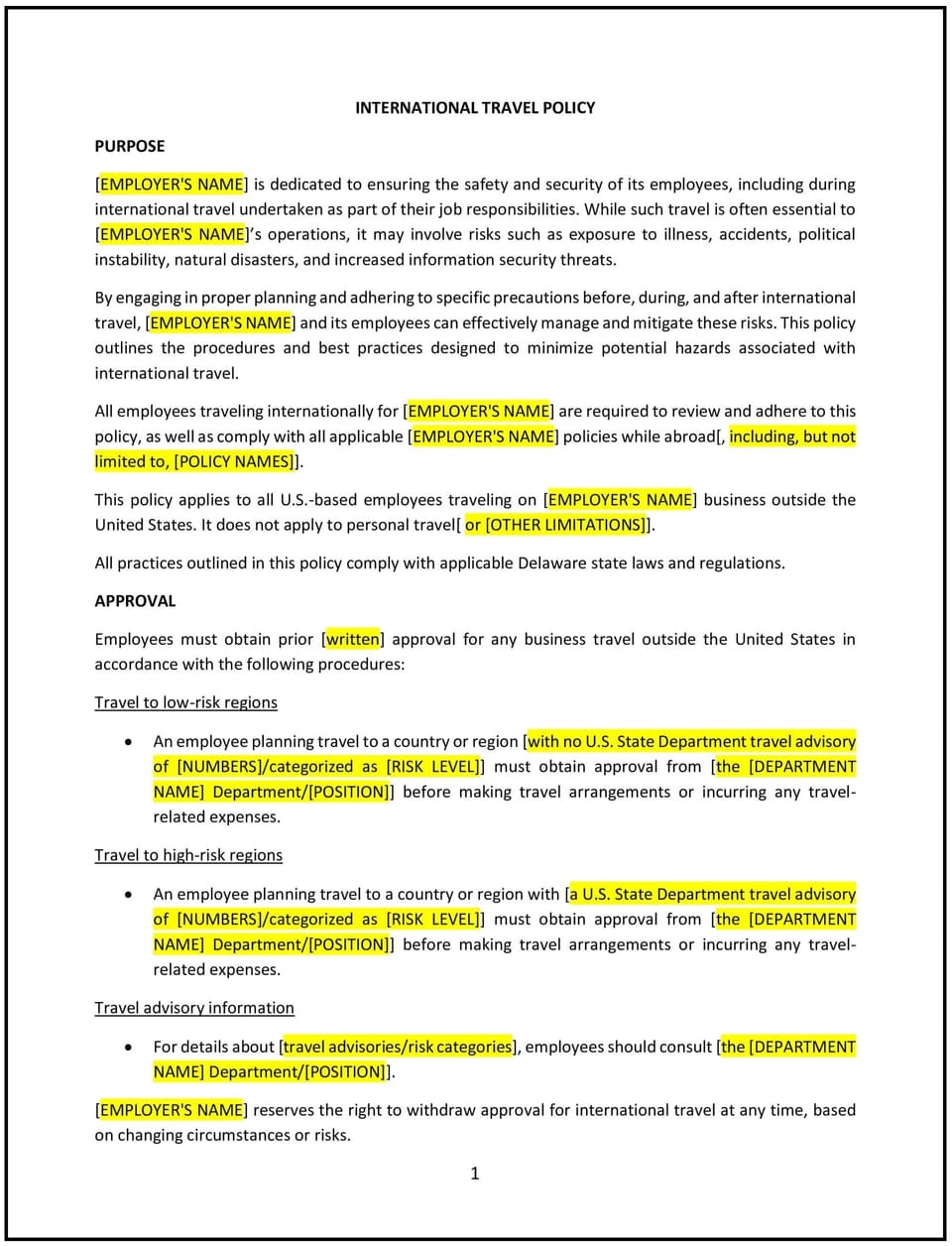International travel policy (Delaware): Free template

IT and electronics communications policy (Delaware)
An IT and electronics communications policy helps Delaware businesses provide clear guidelines on the appropriate use of company-provided IT resources, such as computers, phones, email, and internet access. This policy ensures compliance with security protocols, protects company data, and maintains a professional workplace.
By implementing this policy, businesses can safeguard their IT systems, minimize misuse, and ensure compliance with Delaware and federal regulations.
How to use this IT and electronics communications policy (Delaware)
- Define acceptable use: Outline the proper use of IT resources, such as work-related emails, internet browsing, and software applications, while prohibiting personal or inappropriate use.
- Establish security protocols: Include guidelines for password management, data encryption, and secure file sharing to protect company systems and data.
- Address monitoring: Inform employees about the company’s right to monitor IT and electronic communications for security and compliance purposes.
- Prohibit unauthorized activities: Clearly state activities that are not allowed, such as downloading unlicensed software, accessing illegal content, or using company devices for personal gain.
- Provide training: Offer regular training on cybersecurity best practices, such as recognizing phishing attempts and securing devices.
- Specify consequences: Detail disciplinary actions for policy violations, ranging from warnings to termination, depending on the severity.
Benefits of using this IT and electronics communications policy (Delaware)
This policy offers several benefits for Delaware businesses:
- Protects company data: Reduces the risk of data breaches by promoting secure and appropriate use of IT resources.
- Ensures compliance: Aligns with Delaware and federal regulations related to data protection and electronic communications.
- Maintains productivity: Limits misuse of IT resources, helping employees focus on work-related tasks.
- Reduces legal risks: Provides clear guidelines to prevent activities that could lead to legal or reputational damage.
- Fosters professionalism: Encourages responsible and professional use of company-provided technology.
Tips for using this IT and electronics communications policy (Delaware)
- Communicate the policy clearly: Ensure all employees understand the guidelines and the reasons behind them.
- Use access controls: Implement role-based access to sensitive systems and data to minimize security risks.
- Regularly update: Revise the policy to reflect changes in technology, security threats, or Delaware regulations.
- Provide support: Offer employees IT resources and assistance to comply with the policy effectively.
- Monitor compliance: Use tools to track IT usage and ensure adherence to the policy without overstepping privacy boundaries.
Q: Why is an IT and electronics communications policy important for my business?
A: This policy helps protect company IT systems, ensures compliance with data security regulations, and promotes responsible use of technology resources.
Q: What activities are prohibited under this policy?
A: Prohibited activities typically include unauthorized access to systems, downloading unlicensed software, accessing inappropriate content, and using company devices for personal profit.
Q: How can my business ensure employees follow this policy?
A: Businesses can provide training, monitor IT usage, and clearly communicate the consequences of policy violations to encourage compliance.
Q: What should employees do if they suspect a cybersecurity issue?
A: Employees should report potential security threats, such as phishing attempts or malware, to the IT department or designated personnel immediately.
Q: How often should this policy be reviewed?
A: This policy should be reviewed annually or whenever there are updates to Delaware laws, advancements in technology, or changes in cybersecurity threats.
This article contains general legal information and does not contain legal advice. Cobrief is not a law firm or a substitute for an attorney or law firm. The law is complex and changes often. For legal advice, please ask a lawyer.


